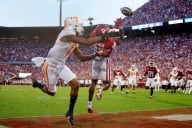You have /5 articles left.
Sign up for a free account or log in.

Ohio State University president Michael V. Drake
Getty Images
In early August, a 1961 Ohio State University alumnus emailed the institution’s president, Michael V. Drake, with a glowing endorsement of head football coach Urban Meyer. A revered figure among donors and fans, Meyer led the program to a national championship and was undefeated against archrival University of Michigan during his seven seasons in Columbus.
But Meyer had gotten caught up in a scandal (not for the first time). He failed to report that one of his deputies, assistant coach Zach Smith, had allegedly abused his wife on multiple occasions. Meyer was accused of covering up Smith’s misdeeds, and when John Rapach, the alumnus, reached out to Drake, it was shortly after the coach had been placed on leave while the university investigated.
Many of the alumni reaching out didn't much care about the allegations per se, though there was evidence Meyer did in fact try to conceal his role with Smith. Investigators for the university found that Meyer had asked an athletics staffer how to change his phone settings so that only text messages from a certain time would be available. This was following the publication of a story detailing the allegations against Smith. Officials and news outlets that tried to obtain those texts were unable to read them.
“I feel strongly that damaging Urban Meyer will greatly erode our base and myself from loyalty to the Ohio State University,” Rapach wrote to Drake.
Perhaps unwittingly, Rapach summed up the sentiments of dozens of Ohio State devotees who contacted Drake that August, when the turmoil on campus was peaking. Supporters and critics, and even casual observers and those outside the sphere of the university’s athletics, were watching how Drake and the Board of Trustees would react, as some viewed the leaders’ verdict on Meyer as a litmus test: whether enormously successful coaches such as Meyer could avoid a harsh punishment despite wrongdoing.
Ultimately, Meyer, who is retiring, was slapped with a three-game ban, which many viewed as light punishment. Before and after that announcement, though, Drake was inundated with a flood of vitriolic and impassioned emails, illustrating the pressure the public applies to university executives during these types of controversies -- when they are weighing a decision that could cost the institution its reputation or millions of dollars (Ohio State’s football program generates $90 million for the athletics department annually).
Presidents have long endured similarly rabid campaigns for coaches, notably this year, too, when the University of Maryland, College Park, president and the University System of Maryland’s Board of Regents was grappling with whether to fire head football coach DJ Durkin after a player died, followed by reports of abusive behavior by athletics staffers.
Inside Higher Ed filed a public records request and reviewed nearly 600 pages of emails that were sent to Drake for about three weeks in August, from the time that Meyer was first put on leave to when Drake and the trustees suspended him.
While pundits took a range of positions on Meyer, the majority of those who emailed Drake urged him to retain the coach and were quite insistent that he do so.
Common themes emerged in the emails: many of those who wrote to Drake believed that news media was pursuing a “witch hunt” against Meyer, that they were prosecuting him in the court of public opinion without knowing all the facts about Smith and his wife. Meyer’s followers implored Drake to disregard these stories, which in part were a result of rampant “political correctness.” Some nastily implied that Drake should not try to replicate the liberalism of California and the tendencies of University of California, Berkeley, a well-known bastion of progressivism. (Drake previously led another UC campus, not Berkeley.)
At least 20 people threatened to withhold donations, and others likened the scandal to the fallout from Pennsylvania State University and Jerry Sandusky. And one man simply called Drake “an ass clown,” in a call for Drake’s resignation, by far not the only profanity that was sent to his in-box.
One man named Jason Newhouse wrote in a curse-laden diatribe to Drake that Meyer's suspension was not enough.
“Wow, The University of Ohio State really sets the bar high, what a Fucking joke a three game suspension!!!! The Big 10 ever since the whole Penn st ordeal has really really down played everything. Must be real nice to get ALL that money for all your big ten schools and get away with beating your wife and raping women and the University’s involved keep their coaches so basically telling us that this is acceptable behavior,” Newhouse wrote. (All emails quoted here are reproduced verbatim.)
Many others attacked Drake and the institution. Ron Knobbe from Minnesota took advantage of his caps lock when he wrote to Drake to “FIRE THIS SON OF A BITCH URBAN MEYER NOW!!!!” or “I will NEVER, EVER watch another Ohio State University Football Game EVER!”
“I HOPE YOUR INSTITUTION GET'S SUED FOR FRAUD and for COVERING UP THIS MESS. I HOPE YOU GET SUED FOR EVERY DAMNED DIME YOU HAVE OR WILL EVER HAVE!!!!!” Knobbe wrote.
A man named Frank Picozzi was a bit more succinct.
He called Ohio State a “sewer” institution.
A Meyer proponent, Derek Mundt, initially emailed Drake with a relatively polite statement: that he supported Meyer and he hoped that Drake would “do the right thing.” After Meyer’s suspension though, Mundt wrote to him, “Seriously go fuck yourself you SJW weasel.” (SJW stands for social justice warrior, a derogatory way to describe someone who promotes progressive values).
Not every commentator was as ill tempered.
Nicholas A. Jordan, a longtime Ohio State enthusiast, wrote to Drake with a lengthy and deferential justification as to why Meyer should continue coaching, ending with that if Drake had read the letter, “it would be a great honor.”
“I believe that Mr. Meyer is currently the greatest recruiter this university employs. Even his predecessor did not have this success in changing young mens lives. His program has produced more successful students than any other professor on campus -- but this one teaches football. If he were to be let go he would have a dozen offers from programs that will say, ‘we’ve reviewed the investigation and found absolutely no wrongdoing by Urban Meyer’ along with a measure of support for the man,” Jordan wrote.
Alumnus Robert Bulas asked that Drake not “fold” to the “sensationalized media” coverage of the dispute with the assistant coach and his wife.
“I ask that no ‘sacrifice’ is given to the media. Penalties, including suspensions, should only be given to the truly guilty, not as a token to the mob,” Bulas wrote.
Many of those who wrote to Drake seemed to borrow the rhetoric of President Trump that he popularized before and after his election. Multiple commenters decried the Meyer coverage as “fake news” and many more complained about “PC culture.”
“I want a president that is a leader at Ohio State and not a PR liberal California coward,” wrote alumnus Paul Condon to Drake and the trustees. “Myself and others are going to push people we know across many OSU alumni forums to get rid of Drake.”
“I cannot even be professional in this letter and feel better to speak exactly how I feel, tonight was a total embarrassment to be a graduate of Ohio State and watch a president with no backbone cave into a false narrative and national perception,” Condon wrote after the press conference announcing the suspension.
Regardless of how the public felt about how Drake handled this situation, Meyer won’t stay at Ohio State. He announced he would retire after the Rose Bowl game in January, citing the stress the suspension caused him and mounting health issues.
But Meyer has retired from college football once before, in 2010, when he was head coach at the University of Florida. Plenty of sports commentators are convinced he will return.








